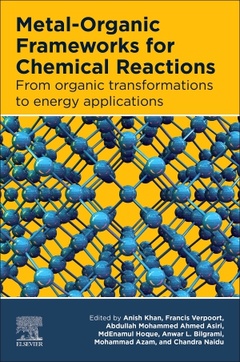Description
Metal-Organic Frameworks for Chemical Reactions
From Organic Transformations to Energy Applications
Coordinators: Khan Anish, Verpoort Francis, Asiri Abdullah M., Hoque Md Enamul, Bilgrami Anwar L., Azam Mohammad, Naidu Kadiyala Chandra Babu
Language: English
Subjects for Metal-Organic Frameworks for Chemical Reactions:
500 p. · 15x22.8 cm · Paperback
Description
/li>Contents
/li>Biography
/li>Comment
/li>
Metal-Organic Frameworks for Chemical Reactions: From Organic Transformations to Energy Applications brings together the latest information on MOFs materials, covering recent technology in the field of manufacturing and design. The book covers different aspects of reactions from energy storage and catalysts, including preparation, design and characterization techniques of MOFs material and applications. This comprehensive resource is ideal for researchers and advanced students studying metal-organic frameworks in academia and industry.
Metal-organic frameworks (MOFs) are nanoporous polymers made up of inorganic metal focuses connected by natural ligands. These entities have become a hot area of research because of their exceptional physical and chemical properties that make them useful in di?erent ?elds, including medicine, energy and the environment. Since combination conditions strongly a?ect the properties of these compounds, it is especially important to choose an appropriate synthetic technique that produces a product with homogenous morphology, small size dispersion, and high thermal stability.
1. Metal-organic frameworks and their composites 2. Metal-organic framework for Batteries and supercapacitors 3. Titanium-based metal-organic frameworks for photocatalytic applications 4. Electrochemical aspects of metal-organic frameworks 5. Permeable metal-organic frameworks for fuel storage 6. Excessively paramagnetic metal organic frameworks nanocomposite 7. The Expanding Energy Prospects of Metal Organic Frameworks 8. Metal-Organic-Framework-Based Materials and Renewable Energy 9. Applications of Metal-Organic Frameworks in Analytical Chemistry 10. Modified metal-natural frameworks as photocatalysts 11. Shape designing of metal-organic frameworks 12. Thermo-mechanical and anti-corrosion characteristics of metal-organic frameworks (MOFs) 13. Metal-Organic Frameworks: Preparation and Application in Electrocatalytic CO2 Reduction Reaction 14. Metal-organic frameworks as diverse chemical applications 15. Metal-organic frameworks as chemical reactions flasks 16. Unique attributes of Metal Organic Frameworks in Drug Delivery 17. Metal-organic frameworks and permeable natural polymers for reasonable carbon dioxide fixation 18. Nanomaterials Derived from Metal-Organic Frameworks (MOFs) for Energy Storage Supercapacitor Application
For about two decades, Prof. Francis Verpoort has carried out broad and fruitful teaching and research activity at Ghent University in various areas of materials chemistry, including organometallics, catalysis, molecular spectroscopy, related with notable applications in the production of fine chemicals and advanced polyme
- Covers the synthetic advantages and versatile applications of metal-organic frameworks (MOFs) due to their organic-inorganic hybrid nature and unique porous structure
- Includes energy applications such as batteries, fuel storage, fuel cells, hydrogen evaluation reactions and super capacitors
- Features information on using MOFs as a replacement to conventional engineering materials because they are lightweight, less costly, environmentally-friendly and sustainable
These books may interest you

Introduction to Reticular ChemistryMetal-Organic Frameworks and Covalent Organic Frameworks 149.17 €

Metal-Organic Framework Materials 182.19 €


